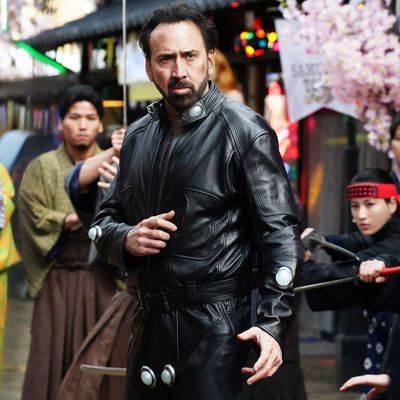
This is the one where Nicolas Cage’s testicle gets blown off halfway through. It’s also the one where he finds himself wading through spike-suited scavengers and jigsaw-mannequin-faced zombies in a postatomic landscape. The one where he battles cowboys and samurais and gangsters all at once. Sion Sono’s Prisoners of the Ghostland throws so much extreme weirdness and violence at us that we might overlook the fact that there’s method to its madness: Beneath the craziness and cacophony lies a tender, tragic tale of emotional paralysis and a civilization eating away at itself.
Cage’s character is simply referred to as “Hero,” which is interesting since in the film’s opening scene, he is anything but: He’s a wide-eyed, bellowing bank robber whose actions, alongside his (more aptly named) sidekick Psycho’s (Nick Cassavetes), cause the death of a young child. Imprisoned for years, Hero is let out by the imperious, all-white-clad Governor (Bill Moseley, sporting a ridiculous drawl) of Samurai Town — a phony Old West–style place populated almost entirely by geishas, cowboys, and samurai — on the condition that he travel into the surrounding atomic wasteland and retrieve the Governor’s beloved step-granddaughter, Bernice (Sofia Boutella). Well, “beloved” … we’ve already seen Bernice fleeing Samurai Town under cover of night, and it’s clear that she has no love for this place or the Colonel Sanders–looking sicko who runs it.
Hero is outfitted with a leather jumpsuit that has explosives placed around the arms, the groin, and the neck — to prevent him from harming or lusting after Bernice, or trying to remove the suit — and given five days to bring her back. And the Ghostland isn’t some kind of vast, empty desert. Not long after he heads out, Hero finds himself in a settlement crowded with different tribes of broken people: a group of gearhead scavengers decked out in makeshift armor; a frozen gaggle of traumatized, paralyzed victims, their faces covered in fractured mannequin masks; and a ragged cult obsessed with preventing a giant clock from moving forward in time.
The whole movie, one could say, is about time. With its cowboys and samurai and geishas all living under the iron fist of the Governor, Samurai Town itself seems stuck at a cinematic intersection, a demented fantasyland constructed out of iconic images of the past. The people of Ghostland, meanwhile, regularly replay the history of the nuclear apocalypse that laid waste to their world. Nobody wants to move forward: One side is trapped by force; the other, by its own trauma and fear. Hero himself discovers that he might have been originally responsible for Bernice’s enslavement by the Governor. He’s also haunted by the images of people he’s killed, but they beckon him with smiles into a blue sky. Is it a taunt? Is it hope? Could it be both? Was any of this worth a testicle?
Anyway, there’s a lot of symbolism in there, not to mention a lot of pro forma, Joseph Campbellian hero’s-journey stuff. But one of Sion Sono’s great talents is throwing so much dazzling, surreal, dreamlike imagery at us that nothing ever feels heavy-handed or cliché. It’s almost like a gonzo variation on the way deep-focus long takes once revolutionized cinema last century; he liberates the viewer to find the things that matter to them.
With Cage’s screen presence to carry us through the story, chaos becomes a virtue. The actor, who spent much of the past decade as a punch line for taking on mountains of paycheck gigs that many deemed beneath his talents, is in the midst of a renaissance of sorts. For starters, viewers have begun to reclaim some of those earlier, easily dismissed efforts and recognized in them the work of a performer always looking to do something surprising. His astonishing turns in such idiosyncratic wonders as Mandy, Mom and Dad, and Pig have also helped.
In Prisoners of the Ghostland, he gets to inhabit a rugged, haunted, macho protagonist. It’s a familiar role, but Cage, who has always been a big actor (how could he not be, with those exaggerated features of his?), is also the rare performer who can be poignant while indulging in pastiche. And so, he lets this seemingly generic action-movie type be funny, angry, ridiculous, and tragic all at once. We understand that if we stick with him, he’ll guide us through this cluttered, beautiful, violent hellscape. And what else are heroes for?
More Movie Reviews
- The Accountant 2 Can Not Be Taken Seriously
- Another Simple Favor Is So Fun, Until It Gets So Dumb
- Errol Morris Has Been Sucked Into the Gaping Maw of True Crime


